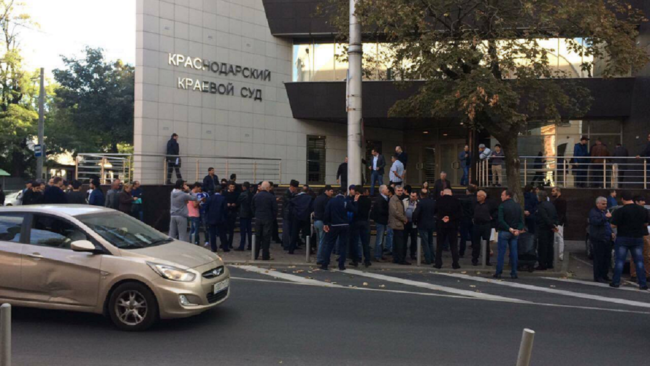

 Ruslan Gvashev, a 67-year-old Circassian activist who was fined for performing a traditional Circassian prayer in public, has ended his hunger strike after 25 days. The appeal against his fine has been postponed.
Ruslan Gvashev, a 67-year-old Circassian activist who was fined for performing a traditional Circassian prayer in public, has ended his hunger strike after 25 days. The appeal against his fine has been postponed.
Krasnodar’s regional appellate court was due to make a final decision on whether to overturn the fine against him on 5 October, but the hearing was postponed until 14 October. After dozens of supporters gathered at the court and urged him to stop, he announced he would abandon his strike.
More than 200 supporters of Gvashev, including both Abkhazians and Circassians, gathered near the regional courthouse in Krasnodar. Abkhaz and Circassians share historic, cultural, and linguistic links.
‘The hunger strikes is over, but the fight has not stopped’, Caucasian Knot quoted one of the participants as saying.
Gvashev, who recently suffered a stroke, was stopped twice while travelling from Sochi to Krasnodar’s district court in an ambulance sent by Abkhazian authorities.
The vehicle was first stopped by approximately 30 people, including members of the patrol police, Caucasian Knot reported. They let the ambulance continue after three hours of delay, but the vehicle was stopped again in Tuapse, near Sochi. According to Ekho Kavkaza, Gvashev changed vehicles three times in order to reach the court.
The delays meant that Gvashev was only able to arrive after the rally had concluded, according to Caucasian Knot.
Gvashev began his hunger strike more than three weeks ago after being fined for performing a public prayer at a sacred tulip tree in the village of Golovinka, near Sochi.
Gvashev performed the prayer on 21 May, which marks the Day of Remembrance of the Circassian Victims of the Caucasian War (Circassian Day of Mourning) 1817–1864. Gvashev is a former head of the Circassian Shapsug Council of Elders; Shapsugs are a Circassian subgroup from Krasnodar Krai.
[For background, read on OC Media: Rally in Sukhumi for hunger striking Circassian leader]
For ease of reading, we choose not to use qualifiers such as ‘de facto’, ‘unrecognised’, or ‘partially recognised’ when discussing institutions or political positions within Abkhazia, Nagorno-Karabakh, and South Ossetia. This does not imply a position on their status.









